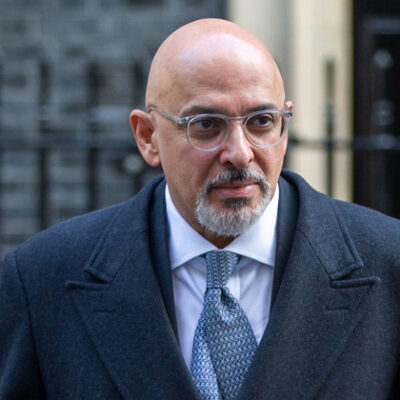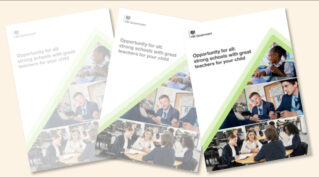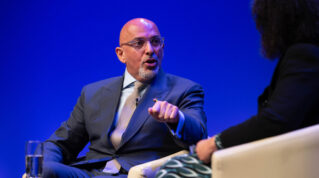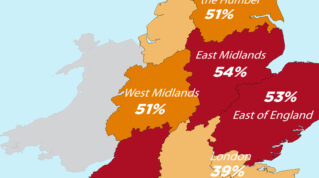Councils will be given the power to set up academy trusts and ask their maintained schools join them under plans to convert all schools by 2030, the government has announced.
Secondary schools will also have to meet a new “ambition” to raise GCSE grades, and leaders will be accountable for providing catch-up under a new “parent pledge”.
As first revealed by Schools Week, the schools white paper due out on Monday will allow for the establishment of council-run trusts, with local authorities empowered to “champion the interests of children”.
Councils will be given the legal power to “request their non-academy schools join a trust, where that is the right approach for local schools”. It is not clear whether they would be able to compel them to do so, however.
Monday’s schools white paper will be the first in six years. The last schools white paper in 2016 set out plans to force all schools to become academies by 2022, but the policy was dropped in the face of strong criticism.

As part of its academisation plans, the government will announce a review of the “accountability and regulation” of academy trusts this summer, to consider how best to hold them to account against a new “strong trust definition”.
This definition will focus on the “quality and inclusivity” of the education they provide, how they “improve schools and maintain their local identity”, how they protect value for money for the taxpayer and how they develop their workforce.
£86 million will be invested in growing and “strengthening” multi-academy trusts over the next three years, with an additional £40 million for “bespoke interventions” to address local issues like high absence in 24 of the government’s 55 “education investment areas”.
“At least” £100 million in funding will also be provided to the Education Endowment Foundation to put the charity on a “long-term footing”.
Leaders question 2030 academies ambition
As reported by Schools Week last month, the white paper will set out plans to encourage all schools to become academies by 2030. But it is not yet known what will happen to those that don’t make the move voluntarily.
The government said it wanted all children to “benefit from being taught in a school in, or in the process of joining, a strong multi-academy trust” by 2030.
Geoff Barton, from the ASCL school leaders’ union, agreed the current school system was “messy and confusing”, but said he was “not convinced that collaboration can only be achieved through the model of multi-academy trusts”.
“We do not think that a deadline for all schools to be in or joining a multi-academy trust is helpful. That said, we are pleased that the government intends to allow local authorities to establish multi-academy trusts.”
Paul Whiteman, general secretary of the NAHT union, warned the academies ambition could become “destructive” if the government “resorts to compulsion”.
“We cannot end up in another philosophical debate about academisation. It is incumbent upon the government to successfully answer the concerns of those schools and communities yet to see benefit in making the change.”
New ‘parent pledge’ and GCSE grade ambition
Education secretary Nadhim Zahawi will also today introduce a “parent pledge”, promising families that schools will intervene if their child falls behind in English or maths.
Schools will “identify children who need help, provide targeted support via a range of proven methods such as small group tuition, and keep parents informed about their child’s progress”, the DfE said.
“We know what works in schools and we are scaling up to ensure that every child can expect interesting, enriching lessons,” Zahawi said. “Parents rightly expect a world class education for their children and that is what we will deliver.”
But Barton said the parent pledge “seems like a policy gimmick designed to grab headlines”, and said it risked “an expectation of an entitlement to various forms of additional support on demand”.

Whiteman said the government “will need to step up with more than bold words”.
“Headlines don’t educate children; professional teachers do that. I hope the ambition in the white paper will result in the support schools need. There has been a support deficit for far too long. Schools cannot do it alone.”
The document will also set out a new “ambition” for secondary schools, aiming to raise the national average GCSE grade in English language and maths from 4.5 to 5 by 2030.
This builds on a target set out in the government’s levelling-up white paper to raise the proportion of pupils reaching the expected standard in reading, writing and maths to 90 per cent by 2030. The rate is currently 65 per cent.
‘Support’ for double-RI schools to join trusts
Ministers have also re-committed to “supporting” schools with two consecutive ‘requires improvement’ ratings to join “strong” trusts, though this affects a small number of schools, and they have still not said whether they will be forced to move.
The DfE also announced on Saturday that all schools will be asked to provide a 32.5 hour week, working out as a 6.5-hour day, Monday to Friday. The expectation will not be a new statutory duty, but Ofsted will report on lower hours of poorly-performing schools.
The government will today publish new data showing pupils “continue to make progress” following the pandemic.
The DfE said the average primary pupil was 1.9 months behind in maths and 0.8 months behind in reading by last autumn, compared to 2.8 months and 0.9 months respectively in the summer.
















Your thoughts